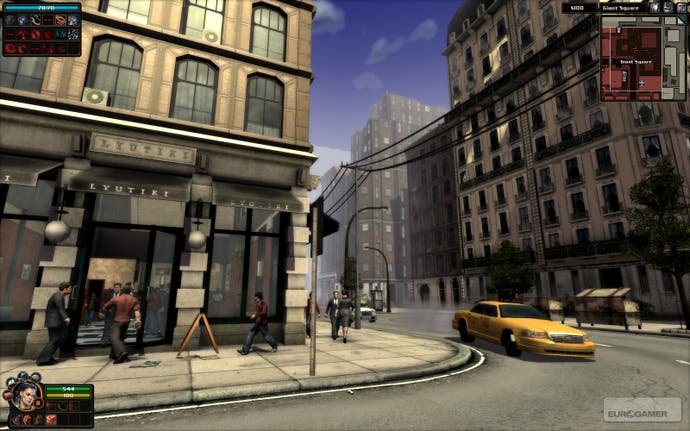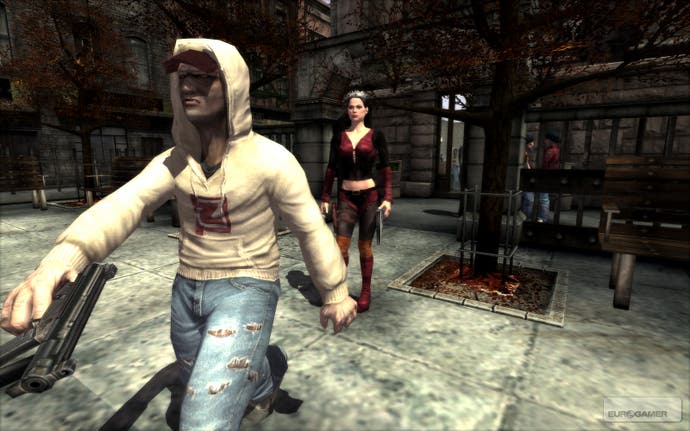Escape From Paradise City
Take me home.
A tree of 24 traits articulates the trio's fighting styles. You might begin the game with Porter's "Demolitions Expert" ability, which lets him lob grenades for 20 less focus (Paradise's currency for special feats), but close out your leveling with "Art of Sniping," which grants a 50 percent enhancement to hit and damage. Angel's "Erratic Movement" helps her dance around bullets while moving, while "Wicked Mind" demonstrates her amiable spirit later in the game, improving her probability of performing critical hits against prone targets by 50 percent.
If traits are the violent bread and butter of your character, henchmen and power skills are the deadly desserts: unhealthy for criminals, and often filled with cream. Ordering enough of both is key to making it in Paradise City. You can hire up to three henchers once you own rights to the bar - gunmen, medics, scouts, and five other types to supplement your street strength. Your posse tends to take a bodyguarding role as they follow automatically: sponging up bullets and clubbings in combat so there'll be less of your own blood in the streets.
Not unlike a well-timed ace, power skills are best described as wild cards that tilt the table. Deployed from a 18-button grid aligned top left, they include "street medicine," which spawns a medic to patch up friendlies; tapping "call vehicle," taxis in a van for the player's use; "assassin" drops in a hitman to track down a specific foe. Others lend simpler support - unveiling a neighborhood's "fog of war" so you can scout ahead, send a squad of police, or phoning in an airstrike to clear a block. Power skills were among the more playfully devastating parts of Paradise we encountered, contributing a sense of measured strategy usually only found in an RTS.

There's individual skills, too, of course. Unlike passive traits, executable attacks like Porter's legshot can drop an enemy to the sidewalk, while his aimshot is a volatile lone round that's worth the two seconds it takes to charge. Rows of boxy icons represent the abilities on screen, but in use the skills lacked a certain luster to accompany them. WoW and other RPGs may have spoiled us with their effect-laden, colorful combat, but there simply wasn't much spark to signify your attacks in the build we played.
On the whole, however, Paradise's presentation is pretty. HDR lighting lends itself to night/day cycling. Sunlight glares off car hoods, manholes spout smoke pillars. Burning garbage bins and graffiti-scrawled walls decorate the cityscape - Paradise seems caked with a layer of erosion to illustrate its nature. We're hungry for a few more indoor areas, however - they're limited to the handful you can exploit for funds and items. Still, it's all captured well by two camera configurations. The overhead point-of-view is not unlike the perspective you get in city-building titles; in your omniscience, you can slide about the city, eyeballing avenues independently of your character. The street-level view is akin to a third-person action title: framed over the shoulder to capture combat intimately.
As you might imagine, all this business of power skills, traits and territory control factors nicely into Paradise's eight-person multiplayer. Accessible through co-op and competitive modes, the few matches we played were all about fast-paced proliferation: advancing your character's abilities and access to items through territory control while muddling your opponent's progress. The power skills encourage a disruptive style we found satisfying - if you're good, your competitors will feel like there's a rain cloud of air strikes, poison bombs, snipers and SWAT teams following them around.

Paradise's ambition as an RPG/RTS blend is admirable, but our hands-on time wasn't sans skepticism about how well it'll cement together. Aside from neighborhood bosses, we encountered just three enemy types during different sections of Paradise's 16 chapters. The environment itself, while attractive, didn't sport much substance - there wasn't much to do aside from taking territory and a token side quest or two. And vehicles? Not so much the free-roaming roadsters you're used to in GTA as one-way, auto-piloted shuttles that are deployed with a specific power skill.
The dynamic combat system may yet redeem some of these shallower sections. Genre-bending is nearing cliche status in the game development world, but we appreciate Sirius trying something relatively new by uniting two over-copied concepts. Urban areas are all but reserved for action titles, but Paradise City leases its land to patient tactics as much as it does playfully dropping an air strike or two on a whim. We'll see if it's something you'd rather escape from or take home come October.

.png?width=291&height=164&fit=crop&quality=80&format=jpg&auto=webp)




.jpg?width=291&height=164&fit=crop&quality=80&format=jpg&auto=webp)
